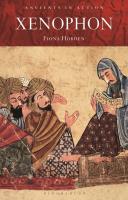
Bloomsbury (2020) p/b 147pp £14.99 (ISBN 978l474298476)
Xenophon has long deserved an introductory yet comprehensive account of his varied output, and this approachable study by H. sits easily on the Bloomsbury list that features Jasper Griffin on Homer and P.J. Rhodes on Thucydides.
H. is well on top of the last twenty years’ busy activity in Xenophontic studies, and has come up with a conspectus of everything from conflicts in fourth century Greek history to the best way to plant olive trees. There is certainly more to Xenophon than the familiar picture of a conservative country gentleman reminiscing on his country estate (a gift from friendly Spartans) about past military adventures.
After a biographical introduction, in which H. claims to encapsulate the underlying principles of Xenophon’s considerable oeuvre as ‘How might we live together?’ and ‘How should we live well?’, she naturally begins by dealing at length with the Hellenica and Anabasis, with an approving glance at Cyrus the Great’s ‘transformation from precocious princeling to savvy king’. This allows her to highlight Xenophon’s preoccupation with person-centred narrative (in which of course he himself features). This in turn throws up the question of what constitutes good leadership. Against a background of defeated expectations in the contemporary world and a failure of great men to emerge as leaders, she detects a strong pessimism over human affairs: the Persian Empire has declined, and political confusion among Greek states has offered little cause for optimism.
Chapter 2, ‘Remembering Socrates’, says H., is the driver behind Xenophon’s intellectual project of defending Socrates’ memory as a ‘great man’ of integrity and civic influence, all the way from his stand in the ekklêsia over the Arginusae generals to the sympathetic recollections of the Apology, Memorabilia, and Symposium. No philosopher to compare with Plato, Xenophon maintains that Socrates’ chosen method of conversational interrogation was in fact a tool to encourage moral improvement (‘How should we live well?’). The Symposium is a case in point. Doubtless with Plato’s similar work in mind (relative publication dates are uncertain), while not attempting to match either Diotima’s scholarly lecture on erôs or the scale and vividness of the spectacular portraits of Aristophanes and Alcibiades, Xenophon gives us instead a sympathetic and carefully differentiated cast of characters being gently pushed by a humane Socrates towards self-analysis as civic actors. It often comes across like a well-written novel, and it contains at least one good joke. Somewhat tenuously through the example of Socrates, H. links these Socratic reminiscences to the Oeconomicus and its protagonist Ischomachus, and a discussion of what it means in a Greek polis to be a kalokagathos, an untranslatable word in 21st terms, usually rendered unsatisfactorily as ‘gentleman’. But the work, meaning ‘Estate Management’, is also full of fascinating insights into well-heeled rural life, and especially into the (fictional, but possibly reflecting real practice) relationship between Ischomachus and his new teenage bride, which describes a kind of equal partnership that is at variance with what one sometimes reads about the position of women in the Greek world. It has become a key text for women’s studies in classics departments, especially in America.
In Chapter 3, ‘Rethinking the Polis’, H. shows that Xenophon doesn’t mount a simple pro- or anti-democratic discussion of types of government that his conservative attitude to his native city might have prompted, concentrating instead on the question ‘What guarantees a city’s prosperity, power, and fame and hence its citizens’ happiness and effectiveness?’. This does involve a tricky balancing act, setting democratic Athens, Lycurgan Sparta, and Hiero’s tyranny at Syracuse against each other. H. faces Xenophon’s admiration for the Spartan polity squarely (one of the chapter’s subtitles is ‘Law and order in a surveillance society’); but I was left with a hard-to-substantiate, perhaps inevitable, feeling of special pleading. She does however observe that Xenophon regarded the corruption and venality of contemporary Spartan leadership as a poor reflection of Lycurgus’ original high moral values.
Chapter 4, ‘Living the Good Life’, returns to Xenophon’s favoured themes of personal morality and leadership, with the implication that living the good life must lead to improving the lives of others. Oeconomicus and Symposium make a reappearance, to underline the point that Xenophon’s world view isn’t exclusively freeborn or male. Slaves may be recognized as moral agents, and women can display, or be educated in, virtues commonly associated with men. Socrates exclaims approvingly that through her household management Ischomachus’ wife exhibits a male habit of mind (andrikên tên dianoian). Not quite #metoo, admittedly, but getting there.
H.’s last section is the obligatory canter through Xenophon’s Nachleben or ‘reception’: not without interest for his reputation in late antiquity, but inevitably less gripping than H.’s fresh and comprehensive reappraisal of this thoughtful writer in the previous four chapters.
It is good to see Xenophon being treated seriously by classicists; he certainly deserves to be rescued from his narrow slot as a repository of ‘easy’ Greek for students just before and after GCSE. This book should be widely known and used.
Anthony Verity
